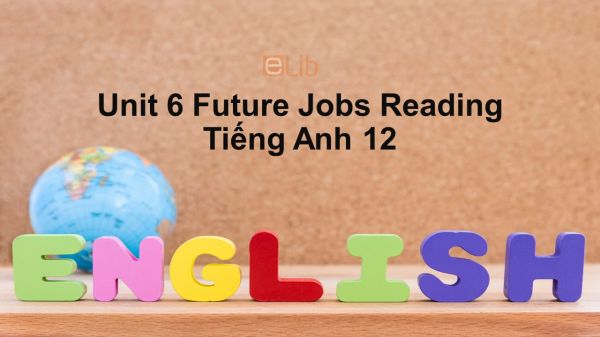Unit 6 lớp 12: Future Jobs-Reading
Bài học Unit 6 Lớp 12 Future Jobs phần Reading truyền tải đến các em nội dung về nghề nghiệp tương lai, nhằm giúp các em định hướng cho tương lai khi đang học năm cuối. Ngoài ra, rèn luyện kỹ năng đọc hiểu đoán nghĩa qua hoàn cảnh và đọc lấy thông tin chi tiết.
Mục lục nội dung

1. Before You Read Unit 6 lớp 12

Work in groups. Tick (✓) the factors that you think would help you succeed in a job interview (Làm việc từng nhóm. Ghi dấu (✓) những yếu tố em nghĩ sẽ giúp em thành công trong cuộc phỏng vấn việc làm)
● wearing casual clothes (mặc quần áo bình thường)
● giving clear, honest answers (đưa ra các câu trả lời rõ ràng, trung thực)
● feeling self-confident (cảm thấy tự tin)
● feeling nervous (cảm giác hồi hộp)
● having a good sense of humour (có khiếu hài hước)
● avoiding difficult questions (tránh những câu hỏi khó)
Guide to answer
✓ : giving clear, honest answers;
✓ : feeling self-confident;
✓ : having a good sense of humour;
✓ : avoiding difficult questions.
2. While You Read Unit 6 lớp 12
Read the passage and do the tasks that follow (Đọc đoạn văn và làm những bài tập kèm theo)
Preparing for a job interview can be stressful, particularly when you are called for the first interview. Below are some pieces of advice that can help you reduce the feeling of pressure and create a good impression on your interviewer.
Before the interview
You should find out as much as possible about the job and the vacancy. Before the interview, you have to send a letter of application and your resumes to the company to express your interest in the job and to show that you might be the most suitable candidate for the position.
When you come to the interview, remember to bring with you your school certificates and letters of recommendation from your teachers or your previous employers. In addition, you may jot down your qualifications and experience that can relate to the job and prepare for the questions that are often asked during the interview.
Make sure you know where the interview is and how to get there. Be on time or a few minutes early. Don’t forget to dress neatly and formally.
During the interview
You should concentrate on what the interviewer is saying and make a real effort to answer all the questions the interviewer asks. Be clear, polite and honest. If you do not know something about the more technical aspects of the job, admit it and stress that you are willing to learn. Show enthusiasm when the job is explained to you. Always show your best side, your keenness to work and your sense of responsibility.
Don’t forget to say goodbye to the interviewer before leaving the office.
After the interview
If you are offered the position, congratulations! If you do not get the job, try not to be too disappointed. Think about the interviewer’s comments because they may help you prepare better when you are called for the next job interview. Good luck!
Tạm dịch
Chuẩn bị cho một phỏng vấn việc làm có thể căng thẳng, đặc biệt khi bạn được gọi cho một phòng vấn đầu tiên. Dưới đây là một số lời khuyên có thể giúp bạn giảm bớt cảm giác căng thẳng và tạo ấn tượng tốt nơi phỏng vấn viên của bạn.
Trước khi phỏng vấn
Bạn nên tìm hiểu về việc làm và vị trí càng nhiều càng tốt. Trước khi phỏng vấn, bạn phải gửi đơn xin việc và bản lí lịch đến công ty để thể hiện sự yêu thích của bạn đối với việc làm và chứng tỏ bạn có thể là ứng viên thích hợp nhất cho vị trí đó.
Khi bạn đến phỏng vấn, nhớ mang theo các chứng chỉ học trình và thư giới thiệu của giáo viên hoặc những người chủ trước. Ngoài ra, bạn có thể ghi nhanh những khả năng và kinh nghiệm liên hệ đến việc làm và chuẩn bị cho những, câu hỏi thường được hỏi ở cuộc phỏng vấn.
Hãy bảo đảm bạn biết vị trí cuộc phỏng vấn và cách đến đó. Hãy đến đúng giờ hoặc sớm vài phút. Đừng quên ăn mặc trang nhã và lịch sự.
Trong lúc phỏng vấn
Bạn nên tập trung vào những gì phỏng vấn viên đang nói và cố gắng trả lời tất cả câu hỏi phỏng vấn viên hỏi. Hãy nói rõ ràng, lịch sự và trung thực. Nếu bạn không biết điều gì về những khía cạnh có tính kĩ thuật hơn của việc làm, hãy thừa nhận và nhấn mạnh bạn sẵn sàng học. Hãy bày tỏ sự nhiệt tình khi công việc được giải thích. Hãy luôn thể hiện những khía cạnh tốt nhất của bạn, sự nhiệt tình với việc làm và tinh thần trách nhiệm.
Đừng quên nói lời chào tạm biệt với phỏng vấn viên trước khi rời khỏi văn phòng.
Sau phỏng vấn
Nếu bạn được vị trí đó, chúc mừng bạn! Nếu bạn không nhận được việc làm cố gắng đừng quá thất vọng. Hãy suy nghĩ những nhận xét của phỏng vấn viên vì chúng có thể giúp bạn chuẩn bị tốt hơn khi bạn được gọi cho một phỏng vấn việc làm kế. Chúc bạn thành công!
2.1. Task 1 Unit 6 lớp 12
These words are from the passage. Look back to the text and circle the best meanings A, B, or C (Những từ này từ đoạn văn. Xem lại đoạn văn và khoanh tròn những nghĩa đúng nhất A, B hoặc C)
1. vacancy
A. a part of a newspaper where jobs are advertised
B. a job that is available
C. a seat that is available
Đáp án: vacancy = a job that is available
Tạm dịch
vị trí tuyển dụng
A. một phần của một tờ báo nơi quảng cáo việc làm
B. một công việc có sẵn
C. một chỗ ngồi có sẵn
2. resume
A. a photocopy of academic certificates
B. a letter of recommendation
C. a short written account of someone’s education and previous jobs.
Đáp án: resume = a short written account of someone’s education and previous jobs.
Tạm dịch
hồ sơ cá nhân
A. Bản sao giấy chứng nhận học tập
B. thư giới thiệu
C. một bản viết ngắn về học vấn của ai đó và công việc trước đây.
3. keenness
A. special interest
B. very quick understanding
C. sense of responsibility
Đáp án: keenness = special interest
Tạm dịch
sự ham mê, yêu thích
A. sở thích đặc biệt
B. sự hiểu biết nhanh
C. ý thức trách nhiệm
4. jot down
A. mention
B. note down
C. type
Đáp án: jot down = note down
Tạm dịch
ghi lại
A. đề cập đến
B. viết xuống
C. đánh máy, gõ bàn phím
2.2. Task 2 Unit 6 lớp 12
Work in pairs. Decide whether the following statements are true (T) or false (F) (Làm việc từng đôi. Quyết định những câu nói sau đúng (T) hay sai (F))
1. Try to reduce the feeling of pressure and make a good impression on your interviewer.
Tạm dịch
Cố gắng giảm áp lực và tạo ấn tượng tốt với người phỏng vấn của bạn.
Trả lời: True
2. Find out as much information as you can about.
Tạm dịch
Tìm hiểu càng nhiều thông tin càng tốt.
Trả lời: True
3. Bring with you a letter of application and your resumes to the interview.
Tạm dịch
Mang theo bạn một đơn xin việc và hồ sơ của bạn để phỏng vấn.
Trả lời: False
4. Take all your certificates and letters of recommendation with you.
Tạm dịch
Mang theo tất cả các giấy chứng nhận của bạn và thư giới thiệu.
Trả lời: True
5. Remember to dress neatly and formally.
Tạm dịch
Nhớ ăn mặc gọn gàng và trang trọng.
Trả lời: True
6. Your voice should be clear and polite.
Tạm dịch
Giọng nói của bạn phải rõ ràng và lịch sự.
Trả lời: True
7. Tell the interviewer about your shortcomings.
Tạm dịch
Nói với người phỏng vấn về những điểm yếu của bạn.
Trả lời: False
8. Remember to say goodbye to the interviewer before leaving the interview.
Tạm dịch
Hãy nhớ nói lời tạm biệt với người phỏng vấn trước khi rời khỏi cuộc phỏng vấn.
Trả lời: True
3. After You Read Unit 6 lớp 12
Work in groups. Discuss the question : Which pieces of advice given in the passage do you find most useful and least useful? Why? (Làm việc từng nhóm. Thảo luận câu hỏi: Bạn nhận thấy những lời khuyên nào được cho trong đoạn văn rất hữu dụng và ít hữu dụng? Tại sao?)
Guide to answer
A: Which pieces of advice in the passage do you think are most useful?
B: Well, I find the advice in Paragraph 3 is the most useful,
C: Why?
B: Because you must present your necessary papers for the job : your qualifications, work experience,....; especially you must prepare the questions often asked in advance.
C: But according to me, I think Paragraph 5 is the most useful.
A: Can you give the reason for it?
C: OK. By following this advice, you can give a strong impression on the interviewer and show that you can be the most suitable candidate for the position.
A: And which piece of advice do you think least useful?
B: Well, personally, I don’t think the pieces of advice in the passage are least useful.
C: Why do you say so?
B: Don’t you think any advice can give us something to think and find out the good lesson?
A: That’s right.
Tạm dịch
A: Những lời khuyên nào trong đoạn văn bạn nghĩ là hữu ích nhất?
B: Vâng, tôi cảm thấy những lời khuyên trong đoạn 3 hữu ích nhất.
C: Tại sao?
B: Bởi vì bạn phải xuất trình các giấy tờ cần thiết cho công việc: trình độ, kinh nghiệm làm việc của bạn, ....; đặc biệt là bạn phải chuẩn bị các câu hỏi thường được hỏi trước.
C: Nhưng theo tôi, tôi nghĩ khoản 5 là hữu ích nhất.
A: Bạn có thể đưa ra lý do được không?
C: OK. Bằng cách làm theo lời khuyên này, bạn có thể tạo một ấn tượng mạnh mẽ với người phỏng vấn và cho thấy rằng bạn có thể là ứng cử viên phù hợp nhất cho vị trí này.
A: Và lời khuyên nào bạn thấy ít hữu dụng nhất?
B: Theo tôi, tôi không nghĩ rằng những lời khuyên trong đoạn ít hữu dụng nhất.
C: Tại sao bạn nói như vậy?
B: Bạn có nghĩ rằng bất kỳ lời khuyên có thể cho chúng ta một cái gì đó để suy nghĩ và tìm ra bài học tốt?
A: Đúng thế.
4. Practice Task 1
Choose the item (A, B, C or D) that best completes the unfinished statement (or best answers the question) about each passage (Chọn câu trả lời đúng để hoàn thành các phát biểu sau đây)
Computer programmer David Jones earns £35,000 a year designing new computer games, yet he cannot find a bank prepared to let him have a cheque card. Instead, he has been told to wait another two years, until he is 18.
The 16-year-old works for a small firm in Liverpool, where the problem of most young people of his age is finding a job. David's firm releases two new games for the expanding home computer market each month.
But David's biggest headache is what to do with his money.
Despite his salary, earned by inventing new programs within tight schedules, with bonus payments and profit-sharing, he cannot drive a car, take out a mortgage, or obtain credit cards.
He lives with his parents in their council house in Liverpool, where his father is a bus driver. His company has to pay £150 a month in taxi fares to get him the five miles to work and back every day because David cannot drive.
David got his job with the Liverpool-based company four months ago, a year after leaving school with six O-levels and working for a time in a computer shop. "I got the job because the people who run the firm knew 1 had already written some programs," he said.
"I suppose £35,000 sounds a lot but actually that's being pessimistic. I hope it will come to more than that this year." He spends some of his money on records and clothes, and gives his mother £20 a week. But most his spare time is spent working.
"Unfortunately, computing was not part of our studies at school," he said. "But 1 had been studying it in books and 'magazines for four years in my spare time. 1 knew what 1 wanted to do and never considered staying on at school. Most people in this business are fairly young, anyway."
David added: "I would like to earn a million and 1 suppose early retirement is a possibility. You never know when the market might disappear."
1. Why is David different from other young people at his age?
A. He earns an extremely high salary.
B. He is not unemployed.
C. He does not go out much.
D. He lives at home with his parents.
2. David's greatest problem is
A. Making the banks treat him as an adult.
B. inventing computer games.
C. spending his salary.
D. learning to drive.
3. He was employed by the company because
A. he had worked in a computer shop.
B. he had written some computer programs.
C. he works very hard.
D. he had learnt to use computers at school.
4. He left school after taking O-levels because
A. he did not enjoy school.
B. he wanted to work with computers and staying at school did not help him.
C. he was afraid of getting too old to start computing.
D. he wanted to earn a lot of money.
5. Why does David think h~ might retire early?
A. You have to be young to write computer programs.
B. He wants to stop working when he is a millionaire.
C. He thinks computer games might not always sell so well.
D. He thinks his firm might go bankrupt.
5. Practice Task 2
Choose the word or phrase (A, B, C, or D) that best /its each space in the following passage (Chọn từ hay cụm từ thích hợp để điền vào chỗ trống)
Manuel Gonzalez comes from Spain. He usually lives in Madrid and works (1) _________ a journalist for a Spanish newspaper, but two years ago he decided to take a year (2) __________ work to live in different countries in Europe and write a book about Europeans. He spent the first two months in Scandinavia (3) ____________ information and then moved to Germany for a month. At present he is staying in Paris, where he is renting a flat for five weeks. Four years ago he wrote a (4) ___________ travel guide to Spain and now he is working hard to have the same (5) ____________ with his book about Europeans.
1. A. in B. for C. by D. as
2. A. off B. to C. away D. from
3. A. collected B. to collect C. collecting D. collection
4. A. best-sell B. best-sold C. best-selling D. best-to- sell
5. A. succeed B. success C. successful D. Successfully
Để nâng cao kĩ năng đọc hiểu với nội dung liên quan đến chủ đề "Future Jobs", mời các em cùng đến với phần trắc nghiệm Unit 6 Reading Tiếng Anh 12 sau đây và luyện tập.
7. Conclusion
Qua bài học này, các em cần ghi nhớ một số từ vựng quan trọng trong bài học như sau
- vacancy ['veikənsi] (n): một vị trí, chức vụ còn bỏ trống
- resume [ri'zjum] (n): bản lý lịch
- recommendation [,rekəmen'dei∫n] (n): sự tiến cử, lời giới thiệu
- jot down [dʒɔt daun] (v): ghi lại tóm tắt
- qualification [,kwɔlifi'kei∫n] (n): văn bằng, bằng cấp
- interview ['intəvju] (n): cuộc phỏng vấn
- interviewer ['intəvjuə] (n): người phỏng vấn
- interviewee ['intəvju’i] (n): người được phỏng vấn
- casual clothes ['kæʒjuəl kloudz] (n): quần áo bình thường
- self-confident [,self'kɔnfidənt] (adj): tự tin
- nervous ['nəvəs] (adj): bồn chồn, lo lắng
- to avoid [ə'vɔid] (v): tránh
- candidate ['kændidit] (n): người xin việc
- school certificate (n) bằng cấp = academic certificate (n)
- previous ['priviəs] (adj): trước (thời gian, thứ tự), ưu tiên
- to employ [im'plɔi] (v): thuê, mướn
- employer [em'plɔɪər] (n): boss [bɑ:s] (n): chủ
- employee [emplɔɪ'i:] (n): worker (công nhân)
- employed (adj)
- employment [im'plɔimənt] (n): thuê nhân công
- in addition to: thêm vào
- neatly [‘nitli] (adv): gọn gàng
- formally ['fɔmlli] (adv): chính thức, trang trọng
- to concentrate on ['kɔnsntreit] (v): tập trung vào
- to make real effort ['efərt] (v): hết sức cố gắng
- technical ['teknikl] (adj): chuyên môn
- enthusiasm [in'θjuziæzm] (n): sự hăng hái, sự nhiệt tình
- to offer ['ɔfə] (v): cung cấp
- disappointed [,disə'pɔintid] (adj): thất vọng
- disappointment [dɪsə'pɔɪntmənt] (n): sự thất vọng
- shortcomings ['∫ɔt,kʌmiη] (n): khuyết điểm, nhược điểm
Tham khảo thêm
- doc Unit 6 lớp 12: Future Jobs-Speaking
- doc Unit 6 lớp 12: Future Jobs-Listening
- doc Unit 6 lớp 12: Future Jobs-Writing
- doc Unit 6 lớp 12: Future Jobs-Language Focus



